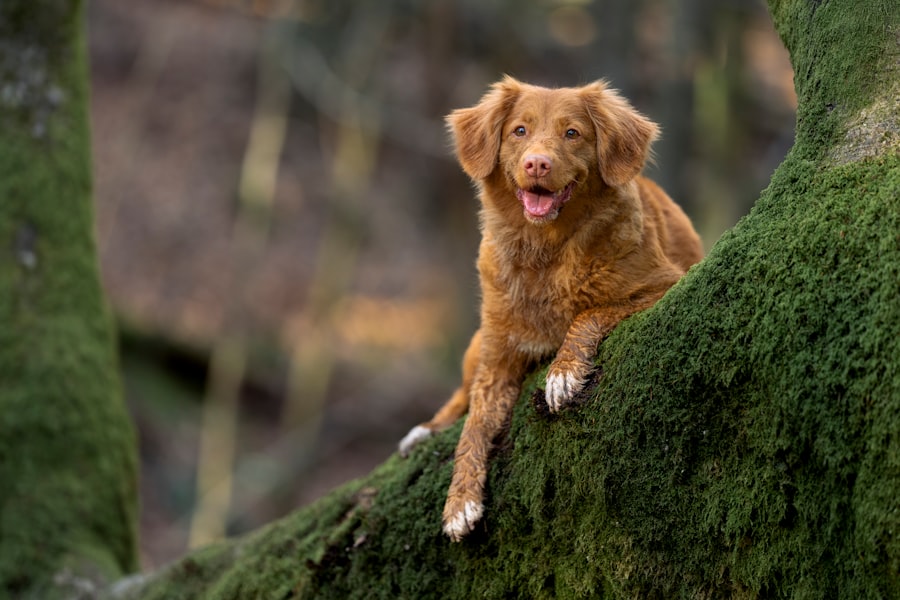The Nova Scotia Duck Tolling Retriever, also known as the Toller, is a medium-sized breed that originated in the early 19th century in the Little River District of Yarmouth County, Nova Scotia, Canada. The breed was developed to toll, lure, and retrieve waterfowl. The Toller’s unique hunting style involves playing and frolicking along the shoreline to attract the attention of ducks, hence the name “tolling.” Once the ducks are lured within range, the Toller retrieves them for the hunter. The breed’s exact origins are not well-documented, but it is believed to have been developed from a mix of retriever breeds, spaniels, and possibly collies. The breed was officially recognized by the Canadian Kennel Club in 1945 and by the American Kennel Club in 2003.
The Nova Scotia Duck Tolling Retriever is known for its intelligence, agility, and high energy levels. They are also highly trainable and excel in various dog sports such as agility, obedience, and flyball. Tollers are also popular as family pets due to their affectionate and loyal nature. They are known for their distinctive red coat and white markings, as well as their webbed feet, which make them excellent swimmers. The breed’s popularity has grown steadily over the years, and they are now found in homes and hunting fields around the world.
Table of Contents
- 1 What to Look for in a Responsible Breeder
- 2 Questions to Ask a Potential Breeder
- 3 Health Testing and Guarantees
- 4 The Importance of Early Socialization and Training
- 5 Finding a Reputable NSDTR Breeder in Pennsylvania
- 6 The Cost of a Nova Scotia Duck Tolling Retriever Puppy
- 7 FAQs
- 7.1 What is a Nova Scotia Duck Tolling Retriever?
- 7.2 What should I look for in a Nova Scotia Duck Tolling Retriever breeder in Pennsylvania?
- 7.3 How can I find a Nova Scotia Duck Tolling Retriever breeder in Pennsylvania?
- 7.4 What questions should I ask a Nova Scotia Duck Tolling Retriever breeder in Pennsylvania?
- 7.5 What health considerations should I be aware of when getting a Nova Scotia Duck Tolling Retriever from a breeder in Pennsylvania?
Key Takeaways
- The Nova Scotia Duck Tolling Retriever originated in the early 19th century in Nova Scotia, Canada, where they were bred to lure and retrieve waterfowl.
- A responsible breeder should be knowledgeable about the breed, provide a clean and safe environment for their dogs, and be willing to answer questions and provide references.
- When looking for a potential breeder, ask about the health and temperament of the parents, the socialization and training of the puppies, and any health testing and guarantees they offer.
- Health testing for NSDTRs should include hip and elbow evaluations, eye exams, and genetic testing for conditions such as progressive retinal atrophy and collie eye anomaly.
- Early socialization and training are crucial for NSDTR puppies to ensure they grow up to be well-adjusted and well-behaved adults. Look for a breeder who prioritizes this aspect of puppy development.
- When looking for a reputable NSDTR breeder in Pennsylvania, consider reaching out to local breed clubs, attending dog shows and events, and asking for recommendations from other NSDTR owners.
- The cost of a Nova Scotia Duck Tolling Retriever puppy from a reputable breeder can range from 00 to 00, depending on the breeder’s location, reputation, and the pedigree of the puppy.
What to Look for in a Responsible Breeder
When looking for a responsible Nova Scotia Duck Tolling Retriever breeder, there are several key factors to consider. A reputable breeder will prioritize the health and well-being of their dogs and will be committed to producing puppies with sound temperaments and good conformation. They will also be knowledgeable about the breed and its specific needs, and will be able to provide guidance and support to new puppy owners. Responsible breeders will also be transparent about their breeding practices and will be open to answering any questions potential buyers may have.
It is important to look for a breeder who conducts health testing on their breeding dogs to screen for genetic diseases that are common in the breed. This can include tests for hip dysplasia, progressive retinal atrophy, and autoimmune thyroiditis, among others. A responsible breeder will also provide a written health guarantee for their puppies and will be willing to take back a puppy at any point in its life if the new owner is unable to care for it. Additionally, a good breeder will prioritize early socialization and will expose their puppies to various stimuli to ensure they grow up to be well-adjusted and confident dogs.
Questions to Ask a Potential Breeder
When speaking with a potential Nova Scotia Duck Tolling Retriever breeder, it is important to ask a series of questions to ensure they are reputable and responsible. Some key questions to consider asking include:
– What health testing do you conduct on your breeding dogs?
– Can you provide references from previous puppy buyers or other breeders?
– How do you socialize your puppies before they go to their new homes?
– What is your experience with the breed, and what are your goals for your breeding program?
– Do you provide a written health guarantee for your puppies?
– What support do you offer to new puppy owners, and are you available for guidance throughout the dog’s life?
– Can you provide documentation of the puppy’s pedigree and health clearances for its parents?
By asking these questions, potential buyers can gain valuable insight into the breeder’s practices and determine if they are a good fit for obtaining a Toller puppy from.
Health Testing and Guarantees
Health testing is crucial when it comes to breeding Nova Scotia Duck Tolling Retrievers. Responsible breeders will conduct various health tests on their breeding dogs to screen for genetic diseases that are common in the breed. This can include tests for hip dysplasia, progressive retinal atrophy, autoimmune thyroiditis, and Collie Eye Anomaly. By testing their dogs for these conditions, breeders can reduce the risk of passing on genetic diseases to their puppies.
In addition to health testing, reputable breeders will also provide a written health guarantee for their puppies. This guarantee should outline what steps the breeder has taken to ensure the puppy’s health, as well as what recourse is available if the puppy develops a genetic health issue. A good breeder will be willing to take back a puppy at any point in its life if the new owner is unable to care for it. This demonstrates the breeder’s commitment to the well-being of their puppies and ensures that they will not end up in a shelter or rescue.
Early socialization and training are crucial for Nova Scotia Duck Tolling Retriever puppies to ensure they grow up to be well-adjusted and well-behaved dogs. Responsible breeders will prioritize early socialization by exposing their puppies to various stimuli such as different people, animals, sounds, and environments. This helps the puppies develop confidence and adaptability, which can prevent behavior problems later in life.
In addition to socialization, early training is important for Tollers. They are intelligent and energetic dogs that thrive on mental stimulation and physical activity. Positive reinforcement training methods work best with this breed, as they respond well to praise and rewards. Basic obedience training should begin as soon as the puppy comes home, and continued training throughout the dog’s life will help maintain good behavior and strengthen the bond between the dog and its owner.
Finding a Reputable NSDTR Breeder in Pennsylvania

Finding a reputable Nova Scotia Duck Tolling Retriever breeder in Pennsylvania can be a daunting task, but there are several resources available to help potential buyers in their search. The first step is to reach out to local Toller clubs or breed organizations, such as the Nova Scotia Duck Tolling Retriever Club (USA) or the Canadian Kennel Club. These organizations can provide a list of breeders in Pennsylvania who adhere to their code of ethics and breeding standards.
Another valuable resource is attending dog shows or events where Tollers are being exhibited. This provides an opportunity to meet breeders in person, see their dogs, and ask questions about their breeding program. Additionally, online forums and social media groups dedicated to NSDTRs can be helpful in connecting with other Toller enthusiasts who may have recommendations for reputable breeders in Pennsylvania.
It is important for potential buyers to thoroughly research any breeder they are considering and ask plenty of questions about their breeding practices, health testing protocols, and overall commitment to the breed. Visiting the breeder’s facility in person is also recommended to ensure that they are maintaining high standards of care for their dogs and puppies.
The Cost of a Nova Scotia Duck Tolling Retriever Puppy
The cost of a Nova Scotia Duck Tolling Retriever puppy can vary depending on several factors including the breeder’s reputation, the pedigree of the puppy, and any additional expenses such as health testing and vaccinations. On average, Toller puppies from a reputable breeder can range from $1500 to $2500 or more.
It is important for potential buyers to consider the long-term costs of owning a Toller beyond the initial purchase price. This includes expenses such as food, grooming, veterinary care, training classes, and supplies. Additionally, potential buyers should be prepared for any unexpected medical expenses that may arise throughout the dog’s life.
While the cost of a Toller puppy may seem high, it is important to remember that reputable breeders invest significant time and resources into producing healthy, well-socialized puppies with good temperaments. By purchasing a puppy from a responsible breeder, buyers can have confidence that they are getting a high-quality dog that has been bred with care and consideration for the breed’s standards and welfare.
If you’re looking for information on breeding and raising ducks, you might also be interested in learning about the mating season for turkeys. Understanding the mating behaviors and seasons of different poultry can be crucial for successful breeding and raising. Check out this informative article on mating season for turkeys to expand your knowledge on poultry breeding.
FAQs
What is a Nova Scotia Duck Tolling Retriever?
The Nova Scotia Duck Tolling Retriever is a medium-sized sporting dog breed known for its distinctive red coat and playful nature. They were originally bred in the early 19th century in the Little River District of Nova Scotia, Canada, to lure and retrieve waterfowl.
What should I look for in a Nova Scotia Duck Tolling Retriever breeder in Pennsylvania?
When looking for a Nova Scotia Duck Tolling Retriever breeder in Pennsylvania, it’s important to find a reputable breeder who prioritizes the health and well-being of their dogs. Look for breeders who are registered with the American Kennel Club (AKC) and who can provide health clearances for the parents of the puppies.
How can I find a Nova Scotia Duck Tolling Retriever breeder in Pennsylvania?
You can find Nova Scotia Duck Tolling Retriever breeders in Pennsylvania by searching online for breeders in the area, contacting local dog clubs or breed-specific organizations, and asking for recommendations from other Toller owners or enthusiasts.
What questions should I ask a Nova Scotia Duck Tolling Retriever breeder in Pennsylvania?
When speaking with a Nova Scotia Duck Tolling Retriever breeder in Pennsylvania, it’s important to ask about the health and temperament of the parents, the socialization and training of the puppies, any health guarantees or contracts, and the breeder’s experience and involvement in the Toller community.
What health considerations should I be aware of when getting a Nova Scotia Duck Tolling Retriever from a breeder in Pennsylvania?
Some health considerations for Nova Scotia Duck Tolling Retrievers include hip dysplasia, progressive retinal atrophy (PRA), and autoimmune conditions. It’s important to ensure that the breeder provides health clearances for the parents and is transparent about any potential health issues in the breed.
Meet Walter, the feathered-friend fanatic of Florida! Nestled in the sunshine state, Walter struts through life with his feathered companions, clucking his way to happiness. With a coop that’s fancier than a five-star hotel, he’s the Don Juan of the chicken world. When he’s not teaching his hens to do the cha-cha, you’ll find him in a heated debate with his prized rooster, Sir Clucks-a-Lot. Walter’s poultry passion is no yolk; he’s the sunny-side-up guy you never knew you needed in your flock of friends!







